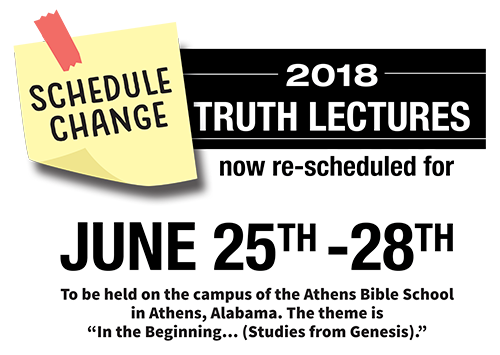

by Chris Reeves
Synopsis: Recognizing the rebellious spirit that is inherent in the progressive mindset, Chris demonstrates how proponents of such would change (and thus corrupt) this divinely-instituted memorial feast.
"The progressive mindset" is evident in the attitude of many brethren today who do not want to be constrained by or limited to the New Testament pattern. They do not want to "hold the traditions" that were taught by the apostles (2 Thess. 2:15), nor "hold the pattern of sound words" that Paul taught (2 Tim. 2:13). They want to be "progressive," i.e., go beyond the teaching of the New Testament. It was the Apostle John who warned long ago: "Whosoever goes onward (Greek proagō, lead ahead, make progress) and abides not in the teaching of Christ, has not God…" (2 John 9). There were progressives in John's day, and they remain with us today.
One area of church practice where we are witnessing the "progressive mindset" is in the observance of the Lord's Supper. Different practices related to the Lord's Supper are being advanced. For example, false brethren like F. LaGard Smith1 and John Mark Hicks2 advocate a common meal to be taken with the Lord's Supper. They describe the Lord's Supper as a "memorial in a meal" (Smith) or a "home meal" (Hicks). These are without New Testament authority.
Some of the progressive practices related to the Lord's Supper that are now being advocated are as follows: (1) observing the Lord's Supper on Saturday night or any day of week instead of limiting it to "the first day of the week" as found in Acts 20:7; (2) all people present, including children and non-Christians, are encouraged to partake of the Lord's Supper instead of limiting it to "brethren" as found in 1 Corinthians 11:33; (3) partaking of the Lord's Supper outside of an assembly of saints instead of limiting it to "when you come together" as found in 1 Corinthians 11:20, 33-34; (4) using regular bread and alcoholic wine instead of limiting it to the "unleavened" bread that would have been present at the Passover and the "fruit of the vine" (Matt. 26:26-29); and (5) eating the Lord's Supper along with a common meal instead of limiting it to "bread" and "the cup" as found in 1 Corinthians 11:23-26. If you are progressive, you just don't want to be limited by anyone or anything, including the New Testament pattern. Let us now examine five arguments set forth by progressives to defend the practice of eating the Lord's Supper with a common meal. 3
Argument 1: The Lord's Supper is to be taken with a common meal because Jesus instituted the Lord's Supper during the Passover meal. Answer: This is an invalid argument for several reasons. First, the setting (or context) of the Passover should not be confused with the Lord's Supper itself. Yes, Jesus and His disciples were "eating" the Passover (Matt. 26:26; Luke 22:15). However, the Passover meal, the upper room, the reclining at table, the washing of the feet, etc., are all a part of the original setting (or context) of the Lord's Supper; they are not the Lord's Supper. When Luke (Acts 2:42; 20:7) and Paul (1 Cor. 10:16-22; 11:20-34) discuss the Lord's Supper, they never mention anything about the original setting, only the Lord's Supper itself. (The closest Paul comes in 1 Corinthians 11:23 is mentioning the night in which the Lord was betrayed.) The Lord's Supper was neither a part of the Passover meal nor an extension of it. From Jesus' standpoint, the Lord's Supper was a "new" memorial looking forward to the coming kingdom (Matt. 26:29; Mark 14:25; Luke 22:18), not looking back to the Passover.
Second, the Passover meal itself was not a common meal, but a meal for the Jews regulated by the OT Scriptures (Exod. 12; etc.). Progressives take a regulated meal, the Passover, argue that it is like a common meal, and then try to attach this common meal to the Lord's Supper. However, they do not even want to be limited when it comes to the Jewish Passover meal (a year old male lamb, etc.). The Lord's Supper was a regulated observance that followed (the cup came "after supper" [Luke 22:20; 1 Cor. 11:25]) another regulated meal—the Passover. If progressives want to add a meal to the Lord's Supper, let them add the actual Passover meal and leave it at that. But, they are not content to do that.
Third, if the Passover meal is authority for a common meal to be added to the Lord's Supper, do Christians today sin who do not partake of the Lord's Supper with a common meal? Are Christians just missing out on a good thing (a common meal), or, are they sinning when they do not include a common meal with the Lord's Supper? Which is it? Please tell us.
Fourth, since progressives tie the Lord's Supper to the Passover meal, here is something to consider. Was the Passover a daily meal or a yearly meal? Or, is the Lord's Supper to be eaten, like the Passover, only once a year? Progressives take the meal part of the Passover and connect it to the Lord's Supper, but do not consider the time element. "Consistency, thou art a jewel."
Argument 2: The "Lord's Supper" is just that, a "supper." A "supper" is an evening meal and should have more than just unleavened bread and the fruit of the vine. According to progressives, it is the Lord's "supper," not the Lord's "snack." Answer: Yes, "supper" (Greek deipnon) in the NT means an afternoon or evening meal. (Will progressives limit the taking of the Lord's "supper" to the afternoon or evening? I doubt it.) However, what is eaten in the "supper" is regulated by the context. The "feast of the Passover" was not a common meal (with all kinds of food and drink); rather, it was a special feast regulated by the OT and is called a "supper" in John 13:1-4. Similarly, the "Lord's Supper" is not a common meal. It is a special observance regulated by the NT even though it is called a "supper" in 1 Corinthians 11:20. The Lord's "supper" (1 Cor. 11:20) is different from one's own "supper" that can and should be eaten at home (1 Cor. 11:21-22). It is rightly called a "supper" because it is something we "eat" and "drink" (1 Cor. 11:27-29, 33). Additionally, Paul's "table of the Lord" in 1 Corinthians 10:21 is not a reference to a "table" with a common meal on it, but it refers back to the "bread" and the "cup" (1 Cor. 10:16-17).
Argument 3: Paul did not forbid a common meal in 1 Corinthians, only how they ate the common meal. Answer: This is the same argument that institutional brethren have made for years attempting to justify the church-sponsored "fellowship hall." Some brethren refuse to admit what Paul said. Paul said that there is eating and drinking (a common meal) that is to be done in "houses" (1 Cor. 11:22), and physical hunger should be satisfied "at home" (1 Cor. 11:34). (A similar distinction is found in Acts 2:42 and 2:46.) Paul's concern is not only that the Corinthians would "wait" for each other, but that they would not be eating and drinking (a common meal) while they were assembled to eat the Lord's Supper. (Progressives who come from an institutional background simply want to eat the common meal with the Lord's Supper during the service in the auditorium, that years before they ate after the service in the "fellowship hall.")
Argument 4: There were "love feasts" in the first century. Answer: Again, this is the same argument that institutional brethren have made for years to justify the church-sponsored "fellowship hall." The "love feast" is mentioned in just one place, Jude 12 (cf. 2 Pet. 2:13). However, we do not know conclusively what these "love feasts" were. We do not know if they were spiritual feasts (teaching) or physical (common meal). We do not know if they were another name for the Lord's Supper or if they were common meals. We do not know if they were eaten by individuals at home or by the entire local church in the assembly. We do not know if they were paid for by individuals or from the church treasury. The most that can be said is that first century Christians would feast with love, that's all. When brethren today make arguments about "love feasts," they do so from silence, from church history, or from modern-day scholars. They are not able to make a sound argument from this one Scripture in defense of a so-called "Lord's Supper meal."
Argument 5: The Lord's Supper was a "fellowship meal." Answer: Like the two previous arguments, institutional brethren frequently made this argument to justify church-sponsored "fellowship halls." When they see or hear the word "fellowship," they think meal. However, the word "fellowship" (Greek koinōnia), found twenty times in the NT, is never used to refer to a common meal. It is used twice in 1 Corinthians 10:16 to refer to the Lord's Supper which is not a common meal.
Progressive brethren are going to do what they want to do instead of what the Scriptures teach. Hicks, for example, is fond of telling others what he "likes," what he "prefers," and what he "thinks" concerning the Lord's Supper. The fundamental issue at stake here is the matter of limits. Progressive brethren do not want to be limited by what is properly exegeted from Scripture. They read into the text (eisegete) many things to broaden their applications of the text and justify their new practices. They appeal to what "scholars" say and what they "think." They interpret the text of Scripture with words like "presumably," "possibly," "seems likely," "perhaps," "appears to have been," "apparently," etc. This opens the door to many unauthorized practices which some brethren are more than happy to walk (or even run) through.
Brethren, let us be content to observe the Lord's Supper simply according to what is taught in the New Testament pattern, nothing more, nothing less. Here are the Scriptures, study them for yourself: Matthew 26:26-30; Mark 14:22-26; Luke 22:14-20; Acts 2:42; 20:7; 1 Corinthians 10:16-22; and 11:20-34.
1 Smith, F. LaGard. Radical Restoration: A Call for Pure and Simple Christianity. Nashville, TN: Cotswold Pub., 2001.
2 Come to the Table: Revisioning the Lord's Supper. Abilene: Leafwood Publishers, 2002. See also Hicks' "Churches of Christ and the Lord's Supper: Twentieth-Century Perspectives" (Stone-Campbell Journal 13 [Fall 2010] 163-176) and the various articles by Hicks on his website: johnmarkhicks.com.
3 For a good critique of Hick's "home meal" practice, see Ron Halbrook's recent lecture, "Sweet Communion, Not A Common Meal" in When We Meet in Sweet Communion. Mark Mayberry, Editor. Athens: Truth Publications, Inc., 2017.
4 "A Lord's Supper Home Meal–A Method." John Mark Hicks. July 24, 2012. Accessed March 28, 2018. http://johnmarkhicks.com/2012/07/24/a-lords-supper-home-meal-a-method/.
5 "Intinction, the Lord's Table and Sacramental Efficacy." John Mark Hicks. December 26, 2011. Accessed March 28, 2018. http://johnmarkhicks.com/2011/12/26/intinction-the-lords-table-and-sacramental-efficacy/.
Author Bio: Chris Reeves preaches for the Warfield Blvd church of Christ in Clarksville, TN. His Bible study website is thegoodteacher.com. He can be reached at chrisreevesmail@gmail.com.
